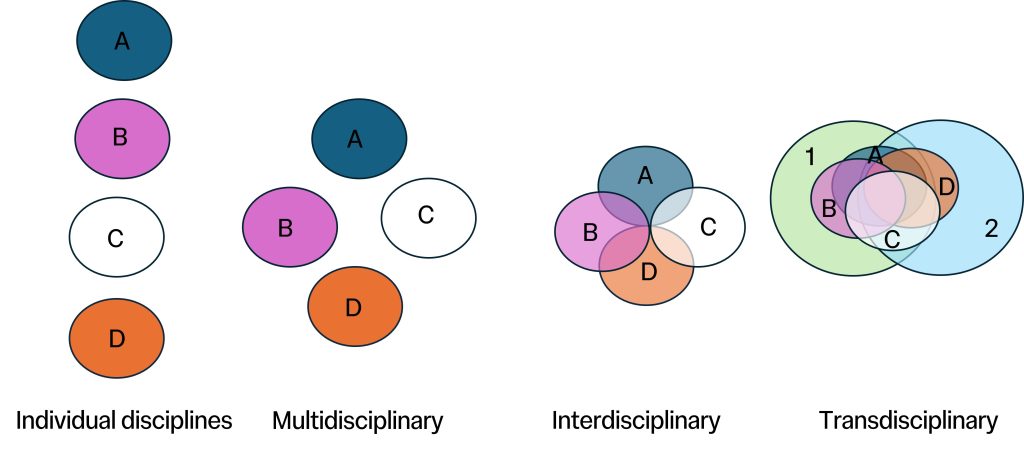The time has come to make new year resolutions! You could aim to learn a new skill, technique or perhaps embrace a new discipline? How about starting a new collaboration with a researcher in a different field? Or expanding research beyond the lab into industry applications and policy recommendations?
If these ideas have crossed your mind, then your new resolution could be to embrace a multi, inter and/or transdisciplinary research approach so solve grand challenges.
Multi, inter and transdisciplinary approaches
We use a multidisciplinary approach when we combine or add up different research disciplines to solve one common problem. Through an interdisciplinarity approach, the research disciplines interact leading to combined solutions by integrating both knowledge and methodologies. Finally, the wider approach is the transdisciplinary one where a different type of stakeholder is also included. A transdisciplinary team includes researchers but also industry members and policy makers.

How do we tackle microplastics in wastewater?
Let’s use a practical example to understand these approaches using the microplastics in wastewater issue.
A multidisciplinary approach will involve investigating the molecular properties of plastic by experts in polymers chemistry as well as scientists whose expertise are enzymes that can alter those polymers. In parallel, there will be researchers in wastewater, measuring microplastics contamination and analysing the environment’s properties. With this approach, we will learn separately the chemistry of plastic, find enzymes able to degrade polymers, the scale of the problem, and the environmental conditions (temperature, volumes etc.) in wastewater.
In an interdisciplinary approach, there will be an integration of the previous three disciplines, exchanging knowledge and methodologies. Through this closer collaboration, there is a potential to design an enzyme that can degrade specific plastic in the conditions present in wastewater.
In the transdisciplinary approach, the three previous disciplines will be joined by experts from industry who could manufacture the solution at large scale and from policy, who could implement changes in the processing of the water.
Transdisciplinary research to solve grand challenges
Imperial’s Schools of Convergence Science take transdisciplinary approaches, researching the problem and looking for solutions. This approach leads to teams including multidisciplinary researchers, industry and policy stakeholders. See algo our blog on ‘why transdisciplinary can be difficult’ to learn about more challenges that require this approach.
Listen to our new podcast on all things transdisciplinary
Back in September, at our annual research showcase, there were talks from all of these stakeholders (scientists, industry members, policy makers). We took the opportunity to ask a few of them what transdisciplinary meant and how it can solve grand challenges. You can hear the diverse answers – and projects – in our new Podcast ‘Wildfires and rhino poo – tales from transdisciplinary research’.
And to learn more about strategies to remove microplastics from wastewater, read our briefing paper.